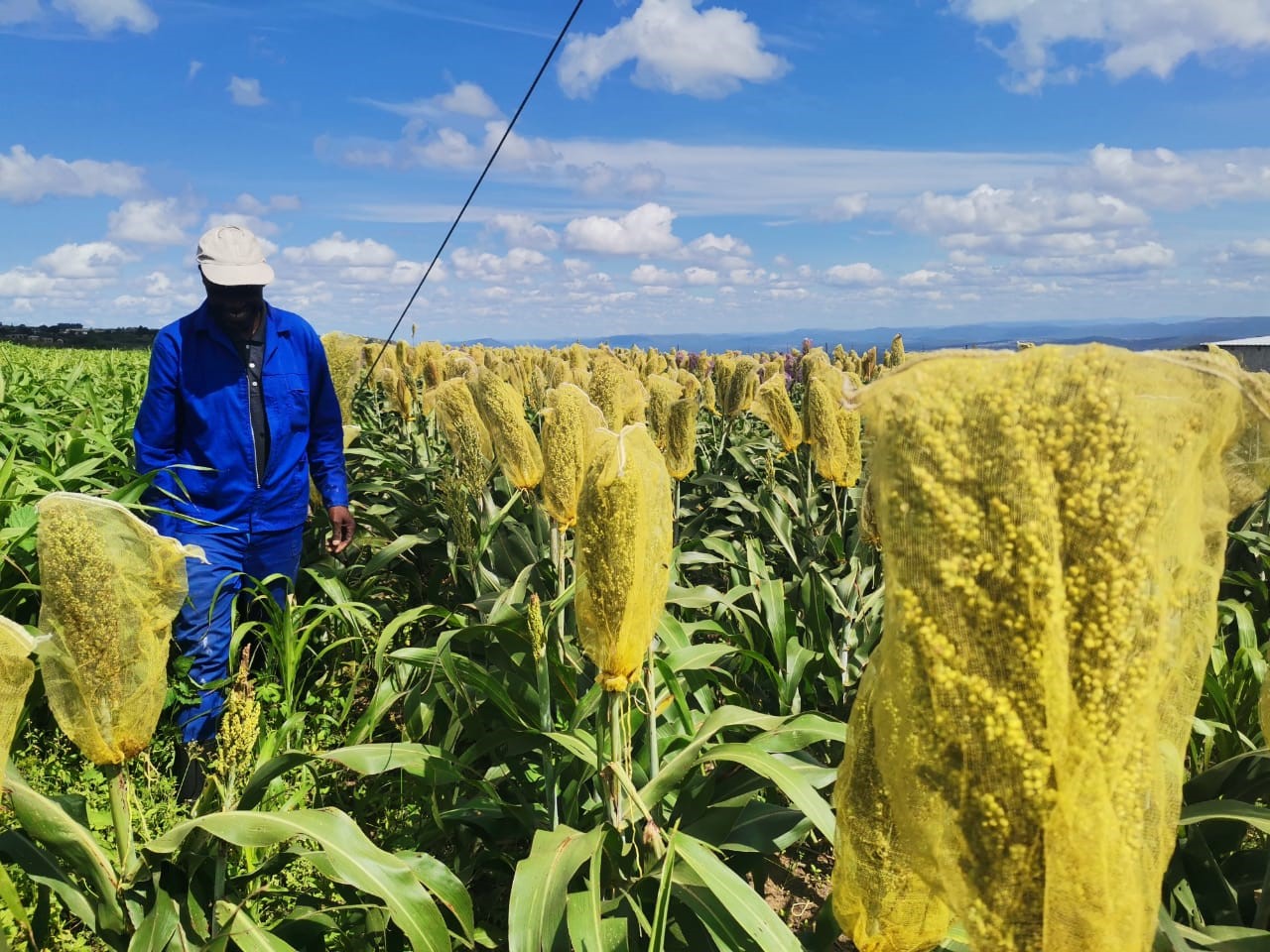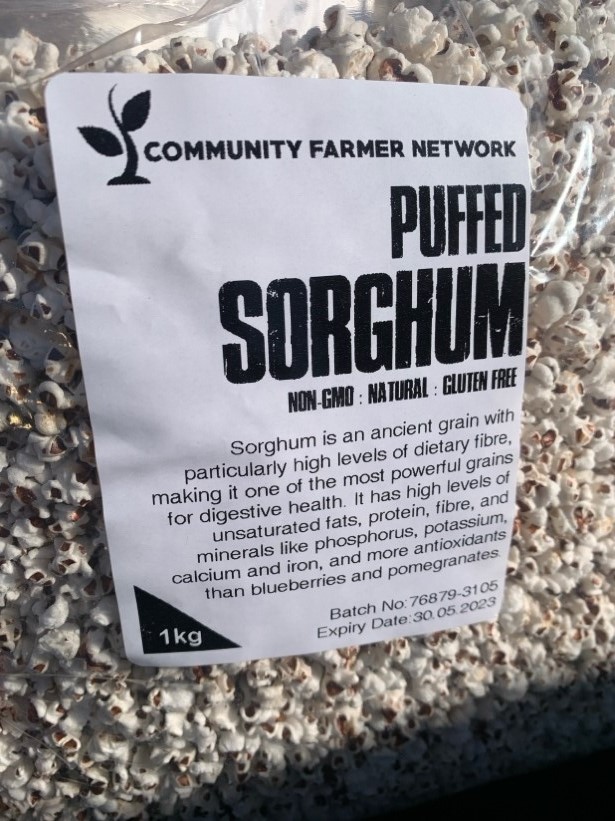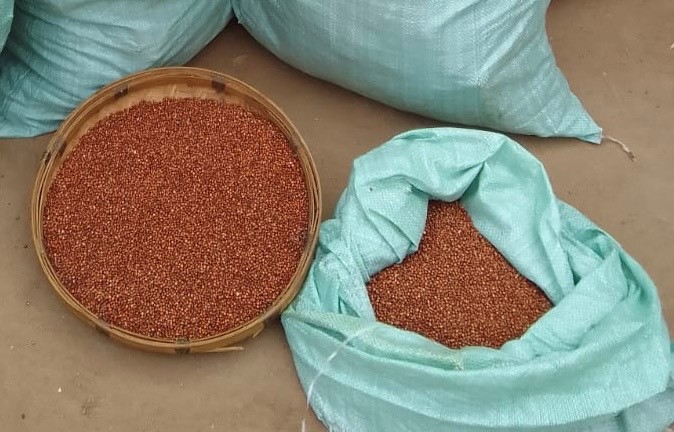AgriFoSe2030 Change Stories
Sorghum production ignites hope for profitable and climate smart agricultural production in Manzawayo village, South Africa

Caption: Fuduka cooperative sorghum crop during 2022-23 season. Photo: Sorghum-cowpea project file pictures
“Low quality grain.” This echoes some of the prejudices of most large and formal markets whenever agricultural produce from smallholder farms is mentioned. Resultantly, smallholder farmers are often overlooked as equal players in formal markets, leaving them to sell locally at uncompetitive prices or barter trade which sadly perpetuates the poverty cycle.
Fuduka cooperative, from Manzawayo village in Nongoma municipality, Zululand district, lives to tell a story of dedication, hardwork and creating positive impressions. Thanks to organisations such as Siyazisiza Trust, a non-government organisation whose dedication to assist smallholder farmers build profitable agricultural enterprises through access to formal markets for fresh produce and indigenous grains gave Fuduka cooperative a glimpse of what could be achieved from producing high quality sorghum grain as they adapt to climate change. When the AgriFoSe2030, Challenge II project “Sorghum-cowpea rotations for climate change adaptation,” was introduced by researchers from Nelson Mandela University and the Agricultural Research council (ARC), led by Dr Nothando Dunjana, the project principal investigator. Anticipation was high, but not without a little uncertainty and risk.
Sorghum is a hardy grain cereal whose origins are traced to East Africa. It is commonly known for its drought-tolerance, low water requirements and ability to withstand periods of excessively heavy rainfall compared to its sister grain crop, maize. Therefore, planting a crop such as sorghum can cushion smallholder farmers against total crop failure in the event of climate change induced weather variabilities such as high temperatures, dry spells, droughts or flooding. The AgriFoSe2030 sorghum-cowpea project was introduced to Fuduka cooperative to bridge the gap between science-based solutions and their adoption in practice, particularly in the wake of climate change.
Adoption is often hindered by complex factors, one of which is weak market linkages for smallholder farmers. As such, at the core of the project’s impact pathway was the key component, to link the farmers to a sorghum market. Having identified Siyazisiza Trust as a potential sorghum buyer and partner, especially given the shared value to foster development in rural agricultural communities, what remained to be seen was what Fuduka cooperative could do with this remarkable opportunity. The AgriFoSe2030 team facilitated the dialogue between the farmers and Siyazisiza Trust, where an understanding of each party’s expectation from the relationship was.
While Siyazisiza Trust expressed interest to buy sorghum, emphasis was made on the importance of high quality, on the other hand, the farmers needed the assurance of availability of the market. Through the multi-stakeholder platforms that the project facilitated, dialogue was established resulting in the development of a business relationship.
Among Siyazisiza Trust’s wide portfolio of value chain development initiatives, is the processing and value addition of indigenous and drought tolerant crops, such as sorghum. Inevitably, high quality grain for the processing of products such as puffed sorghum, was a prerequisite that was emphasised from the onset of discussions.

Caption: A sample of popped sorghum from Siyazisiza Trust. Photo: Sorghum-cowpea project file pictures
Equipped with appropriate crop and soil management knowledge and skills for sorghum production, Fuduka cooperative set to establish a sorghum crop in December 2022, which was harvested in May 2023. The farmers’ dedication was evident as they did all that they could for the crop to thrive.
Upon harvesting, the advice to ensure high quality grain was not lost, as all was done to ensure that the harvested grain was free of soil and other impurities. Thereafter, a sample of the sorghum grain was taken to Siyazisiza Trust’s laboratory for popping quality tests, which were stunningly passed! This ensured that all the sorghum grain that Fuduka cooperative had harvested was sold at a very competitive price. The joy and motivation expressed by the farmers was absolutely heart-warming, especially since this was their first attempt and they had been successful. Unfortunately, some of the grain had been lost as animals had encroached into the cooperative’s log-fenced field.

Caption: Fuduka cooperative sorghum grain after cleaning, ready for selling. Photo: Sorghum-cowpea project file pictures
Despite this setback, Fuduka cooperative celebrate this success and feel motivated to plant sorghum on an even greater scale as Siyazisiza Trust guaranteed them of a ready market. Impressed, Siyazisiza Trust also encouraged Fuduka cooperative to try out another small grain crop, millet, which they expressed keenness to buy, thus diversifying the options of climate smart small grains that smallholder farmers can explore.
As the AgriFoSe2030 project came to an end in December 2023 and bid farewell to Fuduka cooperative, marketing success had been achieved and the excitement for the new season was profound among the cooperative members. On the ground, planting of sorghum had begun on a wider scale for 2024. Moreover, a commitment to direct the proceeds from the sorghum sale towards purchase of a fence was made, complementing their efforts to secure the field and protect the crops in the future. While the project initiated and facilitated communication between the farmers and Siyazisiza Trust, direct communication and a business relationship have been established, thus Fuduka cooperative and Siyazisiza Trust look forward to a long-term relationship of marketing success and building climate change resilience.

Madelene Ostwald, Assoc. Prof.
Challenge leader of Challenge 2
Department of Thematic Studies/Environmental Change
Linköping University
Telephone: +46 708-51 93 11
E-mail: madelene.ostwald@liu.se
 Veronica Brodén Gyberg, Dr
Veronica Brodén Gyberg, Dr
Assistant challenge leader of Challenge 2
Department of Thematic Studies – Environmental Change, Linköping University
Telephone: (+46) 13 28 29 56
E-mail: veronica.broden.gyberg@liu.se